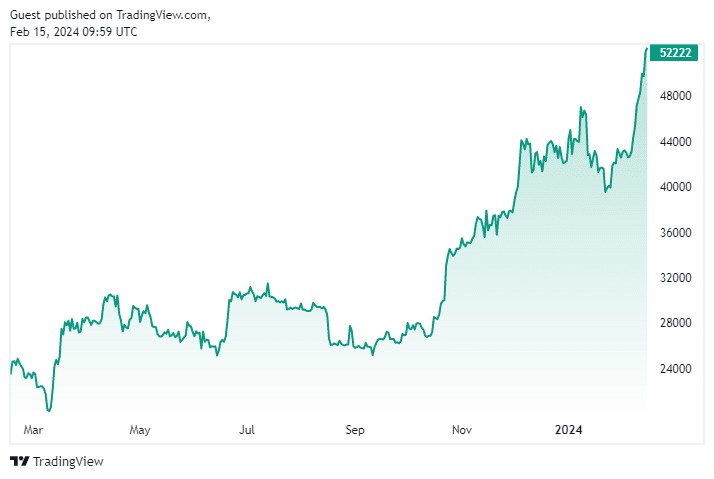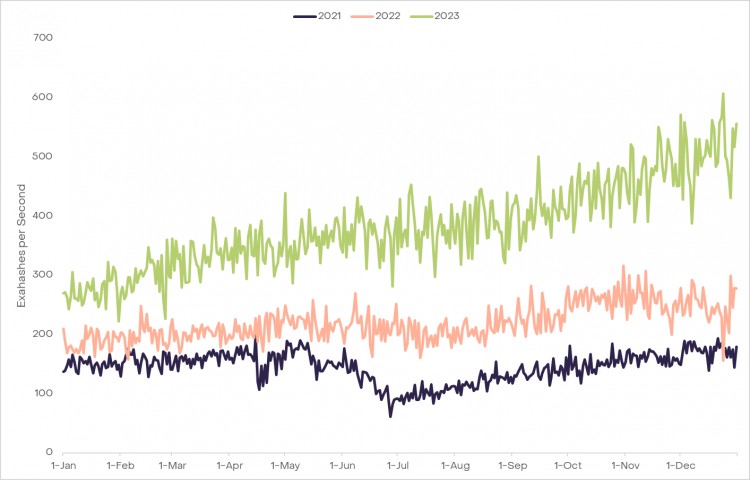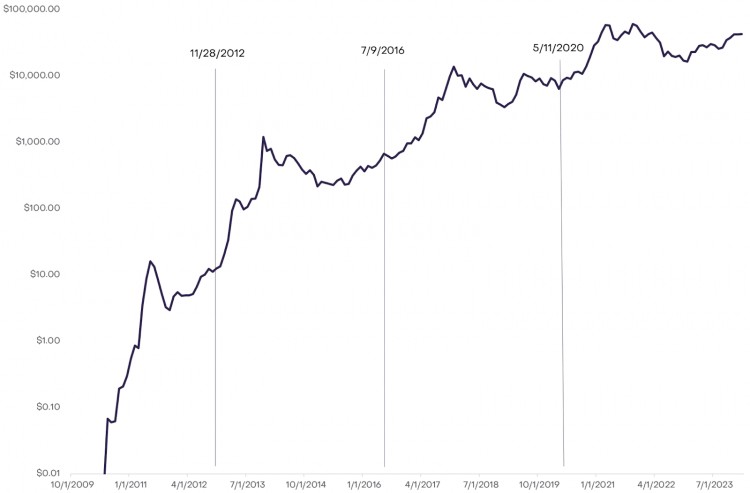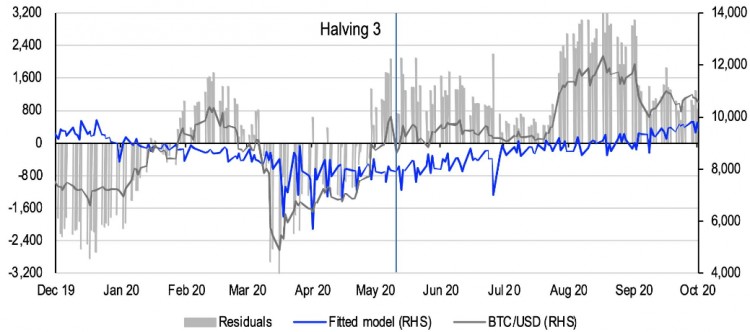Time:2024-02-19 Click:201
在经历了 2022 年加密货币寒冬和 2023 年经济低迷之后,2024 年比特币减半时间表变得至关重要。通过限制比特币的创造,它逐渐限制了比特币的供应,类似于黄金的稀缺性。
比特币的总供应量上限为 2100 万枚,已开采略多于 1900 万枚。这使得剩下的比特币数量接近 200 万个。以下是 2024 年 4 月比特币减半的预期。
冬天过去了吗?
比特币在 2023 年经历了大幅上涨,全年涨幅约为 152%。这次飙升是在 2022 年经历了一段动荡时期之后发生的,在此期间,比特币在 2021 年创下历史新高后,面临着著名项目崩溃、流动性问题和几起引人注目的破产等挑战。
最近加密货币价格的上涨使企业摆脱了停滞状态,促使矿业公司在比特币减半事件之前加速盈利。随着下一次减半的临近,生产比特币的奖励将减半,促使矿工争先恐后地寻求利润。

它是如何工作的?
比特币挖矿涉及使用计算工作验证新交易并将其添加到区块中的奖励过程。矿工确保区块链账本的一致性、货币性和不变性,并获得新创建的代币作为回报。

比特币于 2009 年问世,为矿工提供了每个区块 50 比特币的奖励。 2012 年 11 月,比特币减半至每个区块 25 个比特币,被称为第二个奖励时代。比特币每 210,000 个区块就会减半,从而将提供给矿工的奖励减少一半。这些事件被编程为管理比特币的供需动态,与其预编程的功能保持一致。
奖励减少带来了财务挑战,特别是对于那些严重依赖挖矿收入的人来说。比特币的固定供应加剧了这个问题,如果奖励减少而交易费用或比特币价值没有相应增加,则可能导致破产。此外,挖矿竞争的加剧造成了稀缺性,推高了比特币价格,但挖矿利润却降低了。
矿工兑现
比特币的哈希率(衡量挖矿所需的计算能力)已飙升至历史最高水平。这表明矿工正在利用越来越重要的资源来解决复杂的数学难题并赚取比特币。

算力的历史数据表明,矿商往往会增加资本支出,以在减半之前保持竞争力。这种比特币热潮导致活动前几个月的挖矿难度增加。因此,无法跟上更高生产成本的矿商被迫退出市场。
According to Grayscale, in Q4, 2023, there was a noticeable trend of miners selling their Bitcoin holdings on-chain, likely to build liquidity ahead of the reduction in block rewards. These measures suggest that Bitcoin miners are well-equipped to handle the upcoming challenges, at least in the short term.
Even if some miners exit the market, the resulting decrease in hashrate could lead to adjustments in mining difficulty, potentially reducing the cost per coin for remaining miners and maintaining the network's stability.
Historically, Bitcoin prices have surged following halving events. After the first halving in 2012, the price skyrocketed from $12 to $126 within six months. Similarly, following the second halving in 2016, Bitcoin's price surged from $654 to $1,000 within seven months. In 2020, after the third halving, the price surged from $8,570 to $18,040 in the same time period.

While initial apprehension may prompt some investors to sell off their Bitcoin holdings, renewed interest in the currency is expected to follow. The law of supply and demand will likely stabilize the market, potentially leading to a rebound in Bitcoin prices after an initial drop.
A recentstudyby Coinbase highlights the rising institutional interest in crypto assets, signaling a shift toward more mature market behavior. This trend is characterized by decreasing volatility and a rising inclination toward sophisticated investment strategies. This transition signifies a new era in crypto investment, with institutional players moving beyond mere speculation toward adopting strategic, long-term positions.

As Grayscale points out, the upcoming Bitcoin halving in April 2024 is anticipated to differ significantly from previous events due to increased on-chain activity and positive market updates. Factors shaping this event include:
Miners' proactive measures to raise funds, such as equity offerings and reserve sales, may help offset revenue challenges.
Potential adjustments in mining difficulty, driven by changes in hashrate, could benefit remaining miners by reducing production costs.
The rise of Inscriptions has boosted on-chain activity, with millions of token collectibles generating substantial transaction fees for miners.
Inscription activity offers a new avenue to maintain network security through increased transaction fees as block rewards decrease.
The ongoing adoption of Bitcoin ETFs may absorb selling pressure and positively impact Bitcoin's market structure by providing a stable demand source.
The latter might be a significant factor. U.S. spot Bitcoin ETFs have quickly absorbed significant investment, with initial net flows totaling about $1.5 billion in the first 15 trading days. These inflows, equivalent to three months' worth of potential post-halving sell pressure, hint at the potential for mainstream adoption.
Angel investor Anthony Pompliano suggested that the recent milestone of $50,000 for Bitcoin is not its ultimate peak because of Wall Street interest. He suggested that as Bitcoin continues to climb, individual holders will begin to sell their BTC, leading to increased demand from Wall Street funds eager to capitalize on the cryptocurrency's upward trajectory.
Cryptocurrency analyst Benjamin Cowen elaborated that the early halving-year pattern for Bitcoin typically sees it hitting the bull market support band (comprising the 20-week SMA and 21-week EMA) in January or February of the halving year.
#Bitcoin early halving year pattern -Bitcoin has always gone to the bull market support band (20W SMA and 21W EMA) in Jan/Feb of the halving year.Will this time be different? pic.twitter.com/SgE2PjtCZ9
— Benjamin Cowen (@intocryptoverse) January 17, 2024
Bitcoin has defied bearish market conditions, showcasing remarkable resilience and evolution over the past year. Despite challenges, it has surged in on-chain activity, strengthened its market structure and emphasized its scarcity, challenging outdated perceptions and emerging stronger than ever.
$BTC #BTC #Write2Earn #TrendingTopic #Halving